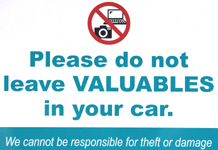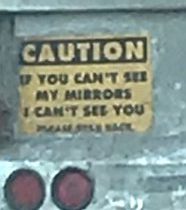Many answers to the questions: are we there yet?
Where are we going? Who will we be when we get there?
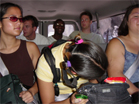
You should not take a trip solely because someone else wants you to.
The drive to your vacation can ruin the vacation.
You should not accept people in your carpool that you do not trust or you know you do not like . . . just because someone else can’t live without them.
Do your packing well before your pickup time or time to meet at a designated place (at least the day before is best).
There is no excuse for passengers who don’t bring money and/or a credit card for their share of gas, park entrance fees, toll fees, chain rentals, etc. Driving chores do not have to be shared evenly, but gas costs etc. do.
You will probably leave town later than you think because it will take longer to pack up than you think, especially with a big group. This means you might arrive after dark even if you were certain you would not. Have your flashlight (electric torch), jacket where you can get to them, not packed away.
Decisions to make BEFORE the trip:
Decide on the full trip length in advance, and not just as you are starting out. If someone needs to be back at work, or … by a deadline then people need to agree to that return time or not travel together.
Decide in advance if you will drive straight through
or make many stops at specific sightseeing places
or unspecific we’ve-got-to-see-that routes suggested by billboards
or we-have-to-turn-around-and-go-back-so-I-can-get-a photo-of-that locations
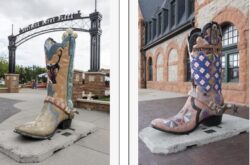
Be sure you are all in agreement about short or long stops. Sometimes this can be up to the driver, sometimes it’s a group decision. The drive from the SF Bay area / Silicon Valley to Yosemite, for example, can take 4 plus hours if you don’t make many stops, aren’t behind slow drivers and do the speed limit. Or it can take 5-6 or more hours if you have a lot of passengers who want fast food or photo taking stops, or you have to put on chains and drive slowly.
On a longer cross country or regional road trip, if you have a destination with a certain time, at least plan for some stops. Maybe each person can have one half-hour spontaneous we’ve-got-to-check-this-out event.
Plan in advance how you will split the park entrance fee. Snow camp carpools and driving directions has a detailed discussion of possibilities for getting an annual pass to all National Parks.
Be sure you agree on food spending as well. If some of the carpool are on a budget, they probably want to eat the food they packed, or fast food, not stop for sit-down restaurant meals. Those who are feeling rich can get fast food on the drive and save their expensive meals for at the destination itself.
Other people in the vehicle will appreciate it if you wear freshly laundered clothing without perfume or cologne and have recently washed yourself and brushed your teeth. Please, do not bring organic French lavender hand sanitizer spray, since it will attract bears into your car, attract mosquitoes to you and some of the carpoolers might be allergic.
We recommend some things to do in advance, or even well in advance
of our between-summer-and-fall-quarter trip to Grand Teton National Park. or a Yosemite trip
Everyone in the vehicle should agree as to the music being played or they should plan to bring headphone players. Some groups say the driver gets to decide. Some say that others have some veto power.
______________________________________
THERE IS NOTHING WRONG
with playing
Runaround Sue, Help Me Rhonda, Johnny B. Goode, On The Road Again, Proud Mary, The Ride of the Valkries, Dead Man’s Curve, Un Bel Di Vedremo, Take It To The Limit, Nessun Dorma, Little GTO, Don’t Think Twice, I Will Always Love You, Little Old Lady from Pasadena, Born to Run, I Never Loved a Man (The Way That I Love You), Wild Thing, Take It Easy, Pipeline, I Get Around, Cry Like A Rainstorm Howl Like The Wind, I Want To Know What Love Is, or …
each and every time you start up the engine, as long as everybody still wants to.
But keep in mind, you might want to play your chosen road trip song then turn off the music during the drive. A study found that drivers listening to music with a fast tempo (especially “loud/aggressive music”) are twice as likely to have an accident. (You experience a faster heart rate and higher blood pressure.) “Many drivers feel that music alleviates boredom and keeps them suitably focused – particularly on longer drives. Others know instinctively that there are times the music should be turned down (or off) but they continue regardless. . . ”
______________________________________
If you plan to drive your own or family vehicle:
before you promise people rides …
Be sure you can get/have the time off work.
Be certain well in advance that your parents/guardians will let you go on the trip/let you drive and/or really will let you borrow the family van.
If you have to pay extra insurance on the family van to be able to borrow it, and intend to pass the cost along to your riders, let them know before they commit to riding with you.
Get a (free) Auto Liability Insurance Identification card from your insurer showing that you have insurance. Some of these cards will list the policy number / expiration and identify the vehicle make, model, and VIN.
It might also be useful to have your employee ID to prove you are employed.
If there is any chance you will decide to go into Canada, quadruple check what documents you will need, including passports for all of your carpoolers, (if you drive someone under 18 there may be more documents needed) and (free and easily obtained from your insurance company), a Canadian Non-Resident Inter-provincial Motor Vehicle Liability Card. Glacier National Park said in 2020 (and we saw it again in 2025) “Be aware that you may not be able to cross the U.S./Canada border with some brands of bear spray. Canadian Customs will allow the importation of USEPA-approved bear spray into Canada. Specifications state that the bear spray must have USEPA on the label.” Please be sure to confirm this if you intend to extend your trip into Canada. Even if, before the trip, you have no intention of going to Canada, please take a look at logistics for a side trip to Canada from Grand Teton National Park, since you could change your mind during your trip.
Get your vehicle checked for drive-ability and do those repairs. There is no excuse for neglected preventive maintenance or a vehicle owner who is willing to drive on a trip when s/he suspects car trouble. Change all the fluids, check and replace as needed all the major components that power, cool, light and stop your vehicle. See road trip vehicle prep and recommended service.
Get decent current maps and use them. (You can not count on your cell phone.) For the Tetons trip, have a big view general map of the west, individual state maps and street maps of the major cities you will stop at: Reno, Elko, Pocatello, Jackson. For the Tetons trip I have a great map of Jackson businesses to give you.
If you might extend your trip or take a different route home, maps of all the possible states / provinces you might go to would be more fun.
Borrowing the family van for an Outdoor Club trip? You are probably used to driving a smaller vehicle and will need to take special care.
If you will be letting passengers take turns driving it would be prudent to have each of them drive the vehicle a little in an empty parking lot. If you are towing this becomes even more imperative, especially having them get up a little speed and try braking to see how long it takes to stop and how it handles when it stops.
If the driver smokes and will be smoking in the vehicle on the drive, s/he should make this quite clear to any potential passengers whenever they offer rides or talk about driving. There is no safe level of secondhand smoke, even for very healthy people.
If any potential passenger smokes they should promise to not smoke in the vehicle or even near other people or the vehicle.
(Some people reading the planning to drive etiquette section above might be thinking to themselves:
“This is all standard procedure. Why list all this? People wouldn’t do anything that dumb.” If you are one of these logical people, read Camping Blunders for a laugh. Or read it if you see yourself reflected in the etiquette rules so you don’t become an addition to the page.)
Packing the car:
How much space is there in the car? What size/number of bags can people bring? Do you each really need your own guitar? No, you really won’t survive a long road trip stuffing too many things in and taking turns sitting with your knees at your chest in the backseat. Can you borrow a cartop carrier? Plan for really waterproof storage for the things in the cartop carrier or pickup bed and extra cord or ? as necessary to really tie gear on securely.
Can the driver still see out the rear-view mirrors?
Pull over and check this packing shortly after each section of your drive. (People have forgotten to close and properly lock rooftop storage and you want to find out before you lose things all over the roadway.)
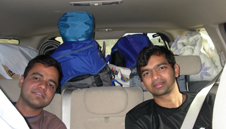
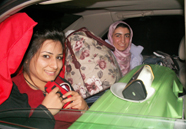
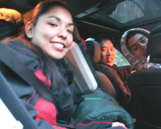

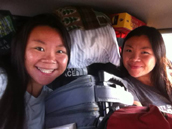
On the Grand Teton trip a car can get there with people taking turns driving straight through in 22 hours (if they are careful about every driver getting enough sleep). If you ride in a carpool driving straight through, pack a small bag with the items you will wish you had for 24 hours so that you don’t need to stop and go through your luggage looking for: your sunglasses, toothbrush/floss, over-the-counter health help, rain jacket, sweater, pillow (especially a pillow shaped so your head can stay upright as you try to sleep, so you won’t fall over on to others trying to sleep), book, journal/pen, camera, laptop, flashlight, headphone CD player, hat with a brim. And see the trip equipment page for the between-summer-and-fall-quarters trip to Wyoming.
Everyone will wish they had earplugs to take their turn sleeping. (Most kinds of foam earplugs do not work well. Wax types, often made with silicon putty, are usually better.)
Pack a bandanna for the inevitable bad hair moments.
The first aid kit, flares, tire iron, etc. should be readily available.
For any Rocky Mountain trip, do not pack the bear spray in the passenger compartment since you have a real risk of it going off (or even exploding in the heat) and causing an accident.
On our Yosemite National park winter trips, when you leave from the Bay Area, it might be warm weather. When you get to Yosemite it will be very cold. It is HIGHLY recommended that if you do not wear them on the drive, you pack your polypropylene undergarments, warm jacket, rain gear, warm hat, gloves and flashlight and boots IN the passenger compartment of the vehicle you will be riding in, and not buried under everything. Many people have been surprised to step out of their heated cars into the cold, and start shivering immediately.
It is worth investing in a spare vehicle key or two or three, in the pockets / daypacks of various people, since your cell phone does not function everywhere in the park and you could need to take a bit of a hike to get to a hotel front desk to try to use their phone to get a Auto Club locksmith to unlock you car when you lock the keys in it. And getting that help to your vehicle can take quite awhile!
Transporting a single kayak? loading a kayak on a car.
Especially if you have any prescriptions an officer might not approve of, they should be in original bottles from the pharmacy and in quantities appropriate for the journey. You do not need a loaded weapon for protection and you should not sneak it into the vehicle. Even one with a permit can be against the law some places.
Be sure that everything on the cartop carrier or in the truck bed is tied on properly. Stop after the first few miles each day to double check and double check briefly again at each gas stop.
Skip this car packing mistake:
From the National Park Service Morning Report, Tuesday, July 20, 2004
Badlands National Park (SD)
Car Fire Averted
Late on the afternoon of July 18th, rangers saw a car heading west on Highway 240 just west of the Panorama Point overlook at a high rate of speed. When they stopped it, they saw that smoke was issuing from the trunk and passenger compartment. The driver jumped out and told the rangers that her car was on fire and that she was looking for help. The rangers removed burning and smoldering blankets from the vehicle and extinguished the blaze. They then searched the trunk, its contents, and the passenger compartment, but found no further signs of fire. The investigation revealed that the vehicle’s trunk latch was not operating properly and that the driver had used a number of bungee cords to secure the lid. Unfortunately, the trunk lid was not secured tightly, allowing the interior compartment light to remain lit. The light became so hot that it melted and caught fire. The burning materials fell on top of a number of blankets and clothing, which then began to smolder and burn. The vehicle was occupied by a family of four from Wisconsin. [Submitted by Mark Gorman, Acting Chief Ranger]
____________________________________
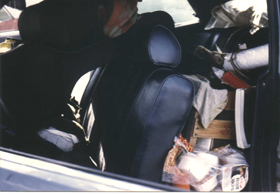
Are you sure you want to drive a thousand miles with a guitar and a sleeping bag wedged in next to you?
Are you sure you want to drive a thousand miles with bags on everyone’s lap?
If everyone brought a large container of full-sized toiletries, as in the left of the photo below, they would take up too much space. By bringing travel/sample sized containers of shampoo, lotion, etc. in a smaller bag, as in the example on the right in the photo below, there is room for even a full sized can of spray insect repellent.
(And on a trip like the between-summer-and-fall-quarter one to Grand Teton park, you can buy full sized toiletries once you get to the park.)
NO!→ 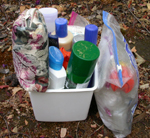 ← Yes!!
← Yes!!
Tear off the appropriate size and number of sheets of foil you will need, fold and pack them with a few plastic sandwich bags as needed instead of bringing whole packages.
Yes! → 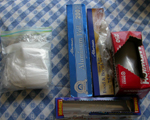 ← No
← No
If you think you can fit five people in a vehicle that seats five AND ALL THEIR GEAR, you need to plan early for how everything will fit (it likely can’t unless you have a large cartop carrier – see advice at Carpool Faqs.
You might even want to get together a few days in advance of the trip, with the bags people want to bring, and try packing.
- Bungee cords can’t be relied on to hold anything down when you pack things on the roof, in a truck bed . . .
____________________________________
On the road:
Long road trips are not the time to try to reform people. They are also not the time to try to make major changes in yourself. These may come as a natural part of this huge experience, but don’t force them.
 Road trips are not the time to:
Road trips are not the time to:
give people stupid nicknames.
distress everyone else with that deep, dark secret you have been keeping.
delve into what these new or old friends r e a l l y think of you.
humiliate someone you have wanted revenge on.
aggravate someone who is afraid of whatever with stories on that subject.
forcefully widen people’s cultural horizons by making them go someplace or take part in some activity they are uncomfortable with.
demand people confined in a space with you try new foods they don’t want to.
demand people confined in a space with you talk on a video you are making.
spend lengths of time telling others about your intimate, personal relationship with Jesus / Buddha / Allah / Krishna / Pachamama / Ishtar / Zeus / Viracocha / the Great Spirit / Mother earth & Brother the sun / Dick Cheney / Rand Paul / Mitch McConnell / Marjorie Taylor Green / Ted Cruz / Tucker Carlson.
Think through practical jokes earnestly before doing them
and then decide to simply describe them to everyone for their enjoyment
You are all stuck with each other, so don’t make your travel
companions absolutely comprehend how stuck they are.
It is quite usual for people, best friends or not, to get peeved at each other on a long trip, but it usually works out and people sometimes even bond more as a result. If the travel arrangements are truly not working out, especially to the degree that you feel unsafe (or, for example, you suspect that the new friend decided to experiment with not using the prescriptions the doctor requires for their mental stability), you can drive discreetly to a police station.
No, you can’t use passengers who are annoying as a hood ornament.
If you are completely on a budget and will not be bringing or buying any snacks to share, then don’t be so free with eating other people’s goodies.
Limit eating the goodies that smell ferociously or make a mess even when handled carefully to being eaten outside of the car during stops. If you must eat barbeque potato chips, bring damp paper towels to wipe your fingers on, instead of wiping on the car seats / your shorts.
Limit the excessive amounts of snacks that genuinely are junk, it’s too difficult to resist them when people are bored and restless. Bring at least some healthy snacks, especially fresh (firm fruit that won’t get easily crushed such as apples or easy-to-peel citrus like tangerines, or carefully packed grapes / plums / tiny tomatoes) or dried fruit, already shelled nuts. You can keep low-salt, Kosher, vegan or gluten-free if you plan ahead and your stomach will thank you.
Plenty of plain water in an unbreakable bottle with an-absolutely-won’t-spill-lid.
It can be quite worthwhile to have periods of silence even when people are all awake. You can even plan for these. Are you going to allow cell phones to ring any time, and allow long conversations? If you travel in a caravan of vehicles following closely enough to use the family band radios, please be willing to be told that you are hogging the radio too much or that we don’t all need that much travel description.
It is not that much of a strain for you to keep your level of profanity and vulgarity down to the comfort level of the biggest prude on the trip.
Drivers should be able to adjust the seat to their leg length, which means passengers in the rear may have to suffer. Wear loose, comfortable clothes to drive. That wallet in your back pocket can give you great pain after many miles. Change your seat position occasionally, tilting slightly back or forward and you might want a lumbar roll for your lower back.
Everyone in the vehicle, not just the driver, will appreciate regular stops. Stop and at least get out and stretch and walk around the car at least once each hour, preferably each half hour. Once a day at one of your bathroom stops, throw a frisbee around or do a 5 minute game of kickball. Or as a way to get a little exercise, glove up and clean all the litter at a reststop. No, we do not recommend having everyone get out of the car and run around it at stop lights.
Yes, you can give the vehicle a nickname: as in a Tetons trip rental car: Swervin’ Mervin.
_______________________
Various thoughts on safety:
The highway is often long and straight,

tempting you to exceed the speed limit, but try not to. You’ll be much happier when you have the time to brake as an animal runs across the road in front of you or a tourist stops suddenly when they think they’ve seen something.
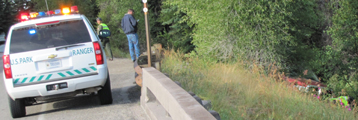
NPS photos:
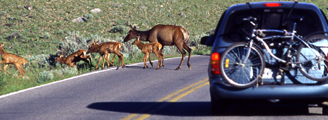
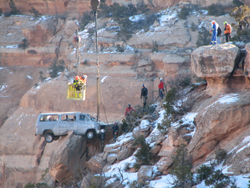
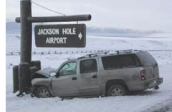
Officers are always right and their cars are always faster than yours. They have friends who are officers in the next jurisdiction who would like to help them out, so, no, you can’t just speed across state lines. What were you thinking?
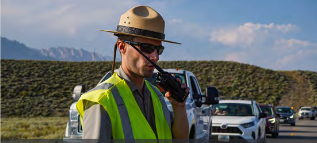
Don’t make stupid jokes with the border station / agricultural station guards, officer who pulls you over. If you get pulled over, even if you are sure you did nothing wrong, be calm and extra polite (but not sarcastically so) when stopped by the police/Highway Patrol/park ranger, sit still and do nothing unexpected.
As you enter any town, the speed limit is likely to lower, so slow down even if you don’t see a speed limit sign hidden behind that huge bush.
Especially when you are driving a vehicle with plates that are out of state, and certainly when the car is overloaded with stuff and you look like tourists, you are a target.
This warning from Canada can apply to any drive, including when you stop at a gas station or to go into a store: “Visitors to large cities and popular tourist destinations should be aware that parked cars are regularly targeted for opportunistic smash-and-grab thefts, and they are cautioned to avoid leaving any unattended possessions in a vehicle, even in the trunk. Due to the high incidence of such crimes, motorists in Montreal, Toronto, Vancouver and some other jurisdictions can be fined for leaving their car doors unlocked or for leaving valuables in view. Visitors should exercise precaution to safeguard their property.”
Another source mentioned smashed windows when car thieves target property left in plain sight such as luggage, purses, electronics, laptops, tablets, and even expensive sunglasses.
A National Park in a major U.S. city had this prevention advice:
Vehicle Burglaries
When visiting the park, be aware of your surroundings and the people around you just as you would anywhere else.
Protect your vehicle and belongings when visiting the park:
1. SECURE YOUR VEHICLE — Keep doors locked and windows rolled up all the way. Take ID’s, passports, backpacks, cameras, and purses with you. Always lock your vehicle, even if you only step away from it for a moment.
2. KEEP ITEMS OUT OF SIGHT — Make sure luggage, shopping bags, electronics, cell phones, cameras, and other items are hidden. Never leave anything on the seats, dashboard, or floor.
3. TAKE ELECTRONICS WITH YOU — Thieves can find phones, laptops, computers, or other devices by scanning for Bluetooth or wi-fi networks. Turn electronics completely off if you leave items hidden in your vehicle.
4. SECURE YOUR CAR KEYS — Never leave your keys in your vehicle, even if you’re just stepping away for a minute. Be careful of where you keep your spare key. Don’t store your spare key on the inside or outside of your car. It can make it easy for thieves to steal your car. A thief wouldn’t even have to find the key in the vehicle to drive away if the car has a push-start feature.
Your trip will be a terrific adventure, but while you are having fun, take care to watch your surroundings. When you stop at gas stations, roadside rests or stores/restaurants, stop and take a good look around before you get out of your car, especially after dark, and remember that others may be listening on your radio frequency.
Don’t always automatically stop for the person waving for help or at the ‘accident’ out in the boonies on a deserted section of road, after dark, etc. Criminals have been known to fake accidents to get Good Samaritans to stop to help them, then rob them or worse. Take a good look before you stop. It might be more prudent to make the 911 call on the cell phone, or even to get the license numbers, or at least the vehicle descriptions and drive to a gas station, rather than stopping.
Don’t always stop automatically when someone in another car points at yours as if to say something is wrong. Drive to the nearest gas station or lit-up store area, then look, in case they are criminals trying to get you to pull over so they can rob you. The same goes for someone faking a small accident by tapping your bumper.
Criminals find an easy mark when people drive without locking their car doors.
CDC advice to Avoid Aggressive Driving
• Keep your cool in traffic!
• Be patient and courteous to other drivers.
• Do not take other drivers’ actions personally
The San Jose Mercury News (California) printed this info:
“What to do when you need to pull over
If you see an accident or a stall, do not stop on the freeway. Take the next exit, call 911 and alert the Highway Patrol. If 911 is busy, call the Bay Area dispatch center for the CHP at (707) 551-4110. If you are involved in a crash or your car breaks down, get off the road as soon as possible.
Other tips:
IF POSSIBLE, EXIT FREEWAY: If your vehicle breaks down, try to drive to the next exit and pull onto a city street. After a minor accident, don’t swap insurance information in the traffic lanes. Stay on the shoulder only if your vehicle cannot be driven.
LOOK FOR SAFETY: Find the safest location. That can be in your car, standing behind the car facing traffic or behind a guardrail.
DANGER ZONES: Avoid stopping in the median area between an on-ramp and freeway, where traffic is whizzing by on two sides. If stopped on a bridge, move 100 to 150 feet away from traffic and use your car as a shield.
PULLING OVER: If you cannot exit the highway, pull onto the right shoulder. Keep your emergency flashers on.
LAST RESORT: If stranded on the shoulder, remain buckled up in your vehicle if there is no other safe location.
Source: California Highway Patrol, Knight Ridder”
Clean windows, inside and outside. Leave enough distance between you and the next car.
Following too close? Trucks sometimes have warning signs to try to get drivers to back off:
If you can’t see the truck driver’s face in the truck rear view mirror s/he can’t see you. Even with professional drivers and good brakes a big truck can’t stop quickly simply because they are so big. But you know enough not to tailgate or cut in front of any size of vehicle, including semis, don’t you?
You don’t tailgate any slow vehicle correct?
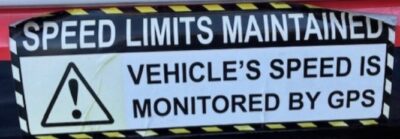
Watch the level of gas. Keep the tank half full so you don’t have to stop at that grungy looking station. But whenever you do stop, take something to clean toilet seats with and your own supply of toilet paper. Nobody goes to a restroom alone.
When you stop at a reststop and go to the restroom, pause at the restroom door after you open it and listen and look before entering. If it seems to be empty, look into each seemingly unoccupied stall before you go about your business.
When you return to your car at the rest stop, be certain it is your car. (We watched a guy get into one of two matching rental cars parked near each other and cause the woman in the car, who had no idea who he was, to squeal. After a brief apology he went to the other car, which was the one he had rented.
We burst into laughter after we drove off.)
Drownings are the number one cause of accidental death in the National Park Service. Next to drowning, motor vehicle crashes are the second leading cause of accidental deaths in the National Park Service. One study found that
“visitors distracted by scenery was a contributing factor in 27% of all motor vehicle crashes,
alcohol was a contributing factor in 23% of the crashes,
visitors from Asia and Europe crossing over the centerline to drive on the left side of the road was a factor in 14% of the crashes,
excessive speed was the primary factor in 8% of the crashes,
and visitors driving off-road and hitting stationary objects or rolling over was the primary factor in 11% of crash fatalities.
Top reasons not to speed in a National Park has a lot of defensive driving advice.

DROWSY DRIVING HAPPENS
Drowsy driving is a contributing factor in up to 24 percent of all crashes and near crashes.
Excess caffeine/sugar, turning on the air conditioner or opening the window and louder music will not work for long. If you look at a road sign and your eyes do not immediately focus, it is time to pull over and it may well have been before that. If your tires hit the rumble strips at the side of the lane it might already be too late.
Overnight shift drivers can extend their share of driving by having someone stay awake with them and talk with them. If you are the partner you should have agreed in advance that you have absolute veto power over their continued driving if you suspect sleepiness.
Frequent light meals make you less sleepy than a heavy meal.
Set your car interior temperature to comfortable for the driver. If you feel drowsy, drop the temp by 15 degrees.
Hey, no drowsyness causing allergy medications.
The hours between midnight and 6 a.m. are the worst for falling asleep accidents. If you want to take turns driving straight through, and plan ahead, you can have drivers alter their sleeping schedule for a few days before the trip. One might make it a point to get to bed early and up early, another to stay up late and sleep late, a third to keep a more standard awake/sleep schedule.
No one person should take a whole midnight to 6 a.m. driving shift.
New York State police note that: “People have a greater tendency to fall asleep while driving on the long, uninteresting stretches of road that are characteristic of many high-speed, rural highways.”
“WARNING SIGNS OF DROWSINESS AND FATIGUE
If you:
· can’t remember the last few miles driven
· have wandering or disconnected thoughts
· experience difficulty focusing or keeping your eyes open
· yawn repeatedly
(The first four above should be enough to tell you it’s time to get sleep or switch drivers. Don’t wait for these last four symptoms! )
· have trouble keeping your head up
· drift from lanes or hit a rumble strip
· tailgate or miss traffic signs
· find yourself jerking your vehicle back into the lane,
– – – then you may be suffering from drowsiness or fatigue.
Continuing to drive in this condition puts you at serious risk of being involved in a fatigue-related crash. You should pull over in a safe place and get some rest before resuming your trip.”
A U.S. Government study of accidents by forest fire crews found that human factors are the major contributing factor to motor vehicle accidents. Level of operator proficiency and experience in the vehicle type as well as fatigue were major problems. Unsafe practices included “talking on a cellular phone while driving and a driver removing an article of clothing while the vehicle was in motion” !!!
From a travel magazine, the tale of a sleepy driver. He wisely stopped for a nap at a roadside rest when he found his eyes trying to close. He said he quickly dozed off and while half asleep, dreamed he was still driving and realized his eyes were closed. He abruptly woke up, gripped the steering wheel and saw a huge tree right in front of him. He screamed. Then he realized he was looking at a tree in a parking lot and started laughing uncontrollably. The couple in the car next to him looked at each other, started up their car and drove off quickly.
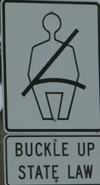
An accident study article stressed the consistent use of seatbelts, even at slow speeds. A vehicle driven on “a narrow mountain road at 5 mph went off the soft shoulder, rolled four times down a 50 percent slope into a steep ravine where the truck struck a large rock and landed upside down. The driver and passenger were wearing their seatbelts and walked away with minor bruises and abrasions”.
If you have ever found yourself subject to road rage, you’ll need to figure out ways to keep these things from happening. No one in the carpool can afford any degree of road rage, or afford to react to someone else’s. Can you pass the ‘Winnebago test’? It’s a test discovered by a friend of the Outdoor Club faculty advisor. If you are stuck on a winding mountain road behind a huge, slow moving motorhome and you realize they are not going to pull over and let the dozen cars behind them pass, will you wreck your vacation? You will arrive late. You can arrive late and be in a ferociously horrible temperament or you can arrive late and be in a good mood. Either way it’s up to you, not up to the driver of the slow moving vehicle.
“There’s a lot of [deleted] you have to put up with when driving, [for example] the other cars.
Thousands of these other cars, many of which have people who have licenses apparently.”
— George Carlin
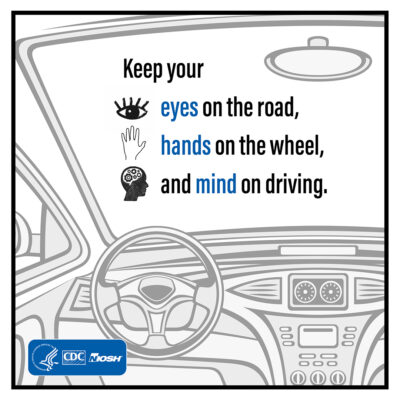
Both hands on the wheel, eyes on the road.
— When traveling at 65 mph, as you turn your eyes away from the road for just a second,
you travel 95 feet.—
The CDC warns: “Do not multitask while driving. Whether it’s adjusting your mirrors, selecting music, eating, making a phone call, or reading a text or email―do it before or after your trip, not during.”
Let someone else change radio stations, music CDs/tapes, identify what kind of hawk that is, talk on the cell phone. Someone else can text message people in another caravan vehicle. If your navigator can’t figure out the route, (that you looked at in advance of taking off each day) pull over to read the map. While you are pulled over you can drink some more coffee, dig into the bag of cookies.
Dialing a cell phone triples your risk of crashing. Reaching for a moving object, like that cookie or phone you are dropping, increases your risk of a crash nine fold. Texting makes you 23 times more likely.
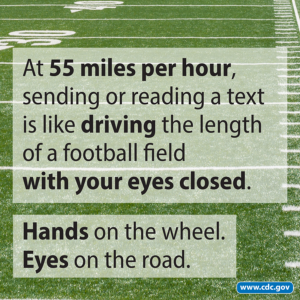
And yes, there are laws in national parks the same as the rest of the roads:
U Drive, U text, U pay
and Phone in One Hand, Ticket in the Other.
A Miami University of Ohio study showed that chatty drivers
took 15% longer to hit the brakes when they needed to stop.
– – – – – – – – – – – – – – – – – – – – – – – – – – – – – – – – – – –
When bison want to cross the road they have the right of way. They will take their own sweet time. Honking your horn at animals just confuses them or can make them angry.
Trying to get them to move on faster is dangerous.
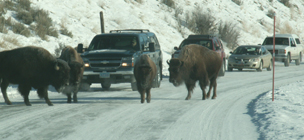
“Assume that animals do not know to get out of your way. Young animals, in particular, do not recognize cars as a threat.
Lower your dashboard lights slightly. You’ll be more likely to see your headlights reflected in the eyes of animals in time to brake” is advice from experts.
When should you brake, when should you swerve? The answers are at:
How to not collide with a deer
– – – – – – – – – – – – – – – – – – – – – – – – – – – – – – – – – – –
Pull fully off the road, park carefully and set the handbrake when you stop to take a picture.
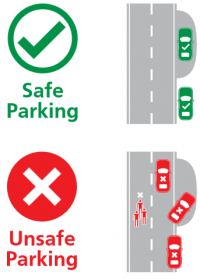
See also the RECKLESS PARKING section of fatal, near fatal or close call incidents/accidents in camping, backpacking, climbing and mountaineering
When it is really windy outside, if everybody opens their doors at once, or even if more than one door or one door and the hatchback is opened, everything inside will blow around and even out of the vehicle.
Ways to keep from being so bored.
Bring your own music, there are many roads in the US with no radio station, AM or FM that can be received, or that are worth listening to beyond some curiosity as to how the rest of the world lives. Check in advance at an online radio station list for which stations to look for.
Michael, an Outdoor Club veteran of long drives says: “Listening to the radio when others are asleep is okay, make sure you keep it to a level significantly lower than you would normally listen to that music. If you can, set the music to only come out of the speakers that are near you and not near the sleeping adventurers.”
Again, please note; A study found that drivers listening to music with a fast tempo are twice as likely to have an accident.
(You experience a faster heart rate and higher blood pressure.) “Many drivers feel that music alleviates boredom and keeps them suitably focused – particularly on longer drives. Others know instinctively that there are times the music should be turned down (or off) but they continue regardless. . . ”
As we said earlier, it can be quite worthwhile to have periods of silence even when people are all awake. You can even plan for these. Individual headset players for part of the trip can be a relief from other choices of music that you can stand but just barely. At the library you can borrow books on tape (novels or history, etc.) Relearn how to speak that language you took in high school with tapes borrowed from the library, or teach each other phrases from languages you speak.
If everyone brings a favorite book/novel and recent magazine they’ve already read, you can trade around. This can fill some quiet time without music.
This takes advance planning, but try having each person bring one or two of their favorite poems, or a short chapter section to read aloud.
The Mountains of California, by John Muir http://www.gutenberg.org/ebooks/10012
We recommend these chapters:
VII THE GLACIER MEADOWS
XII SIERRA THUNDER-STORMS
XIII THE WATER-OUZEL
The Yosemite, by John Muir http://www.gutenberg.org/ebooks/7091
some favorite chapters include:
Winter Storms and Spring Floods
Snow-storms
Snow Banners
as well as chapter XXX of Cannery Row by John Steinbeck, or Hay For The Horses by Gary Snyder.
Bring a project that takes lots of hands-on time: needlework, a writing project on your laptop. On the drive home, if you took digital pictures and your laptop is loaded with Photoshop Elements, you can crop, size and adjust your pictures. Photoshop Elements is much cheaper than full Photoshop and does almost everything the full program will do.
Keep a journal of the trip with parts written by each member. To start, write down the starting mileage date and time.
Take a picture of what is in front of the car every 100 or 200 miles. (Another excuse to get out and stretch.) An Outdoor Club road trip veteran, Wendy, advises us: “write down in your travel log, where you are (or where you think you are), the time/date, the mileage, and the frame/roll number of the picture.
After the trip, we wondered where/when those pictures were taken.”
Below, Wendy leans over a car to use it as a tripod in low light on a foggy day during the September 2000 Tetons road trip. Photo by Renae Aguilar.
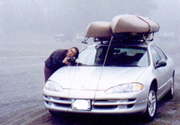
Take at least one daytime and nighttime picture of each driver at the wheel somewhere along the road. Take pictures of people sleeping in the car (but they have the right to destroy them after careful consideration for a couple of days.)
Photos below of drivers Alan and Renae by Wendy Sato.
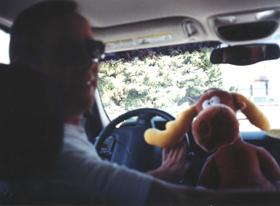
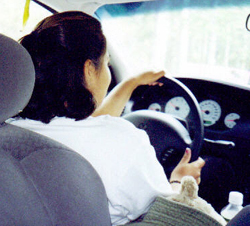
Do feel free to take dumb pictures of the vehicle and/or participants next to road signs. (Another excuse to get out and stretch.)
(Welcome to California sign by Alanna Klassen, continental divide photo by Mark Nevill, Montana sign photo by Mark Nevill, rental car and trip mascot photo by Wendy Sato, road sign and friends photo by Kevin Halseth)
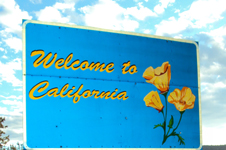
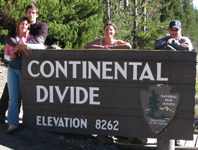
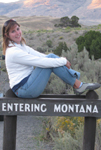
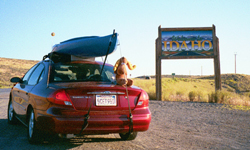

The photographer of the car/mascot photo says “They are not DUMB pictures, they are FUN pictures!!! They also give the driver the chance to take those pictures you mentioned of their passengers sleeping, snoring, drooling, etc.
(Photos below by Wendy Sato)
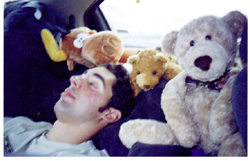
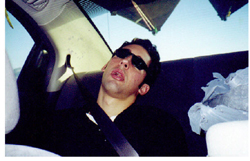
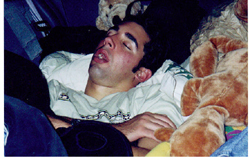
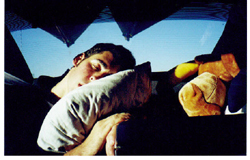
If you are still in the dark ages of 35mm film, be sure to number your film rolls. Renae and I had 23 rolls of film on our Teton trip with Kevin. We still love looking at all those pictures.”
Stop at a general store in nowhere (as well as your destination) and get local postcards and write and mail them. You will need people’s addresses, so pack a page of them.
Plan ahead for each person to bring supplies to teach everyone something useful (or not), such as how to: play cat’s cradle, tie a bowline, use basic phrases from your other languages, fold an origami bird
or use the first aid questions for a secondary assessment
and during a stop: juggle, twirl a baton, skip rope, keep a straight line of sight while spinning, (as in a ballerina or skater performing), throw a curve ball, skip a stone on the water, rock the baby on a Yo-yo…
No, you are not too grown up for travel games.
You’ll know when you are bored enough on a long drive, or, hey, start before you are.
ROAD TRIP GAMES
Bring your favorite trivia game, a magnetic chess or other game board, deck of cards. Does a flush beat a straight? Bring a list of the rank of hands of poker to solve arguments.
Whadaya know good? Each person teaches the rest of the group the most important things (and/or weirdest things) they know from their work.
A standard road trip or around the campfire game is 20 questions. One person writes down an answer on a piece of paper and tells everyone if they are a person, place or thing. (Or sciences majors can use animal, vegetable or mineral.) Everyone else gets to ask the player a question in turn for a total of total of 20 questions. The questions must be worded so they can be answered yes or no. As each person asks and gets an answer they can make one guess. The winner is the person who guesses or the person who was it if no one guesses. The group can decide that each person takes turns being it, or the winner each time gets to be it.
Liar. The starter tells the group three statements about themself. Two are true, one is not. Everyone votes which one is the lie and then tells why. Or use two lies and one truth. This one can be fun and even a little risque without getting as mean as truth or dare.
Know lots of celebrities or politicians names? One person says the name of one, then the next person must name a different one whose first name starts with the last letter of the surname of the one just said. Or do it with the first letter of the surname. Or use single word geographical place names and the last letter of the place.
Name the worst carload of companions. Describe what would happen if they got together in a confined space for a time. Especially good if you are into politics or classical literature.
Our world is full of acronyms like CIA, CDC. Think up new ones based on license plates of cars around you.
Math geniuses know lots of games. Count out loud to 100 trying to skip each numeral with a three in it AND each divisible by three. 1, 2, skip, 4, 5, skip, 7, 8, skip, 10, 11, skip, skip, 14, skip, 16 … Someone else can try it with three, five, seven or nine. Or try counting backwards. Or subtracting seven from one hundred.
____________________________________
While anticipating a multi-state road trip we decided to invent the
u l t i m a t e road trip bingo/scavenger hunt game.
Go to: road trip bingo or scavenger hunt
____________________________________
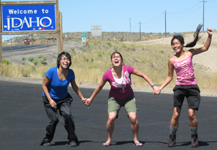
Storytelling, debates and discussions:
Also quite useful when stuck in a tent in a blizzard.
Each person tells a story of what they want from the trip at hand.
Each person tells a story of a vacation gone bad.
Each person tells what they would do with a million dollars, (or in this economy, maybe fifty million).
Each tells what they would like to invent.
Each describes a house on steriods they would build if they had unlimited money and space. A typical large home is 2,000 to 2,500 square feet. Bill Gates property is 66,000 and his main house is 11,500 square feet. The Biltmore estate had 250 rooms.
One person starts an imaginary story on any subject for a couple of sentences, then points to another passenger who must continue in the same vein, then the next person.
Each person in your vehicle makes up a different story about the people in the car next to yours.
Or wait until three or more cars are following each other where you can all see them. One person makes up a story about people in the car at the front of the row, then points to someone else in your vehicle who must continue the same story involving the people in the car behind that car, etc.
Be careful to not make occupants of another vehicle angry by pointing at them eagerly.
Defend the proposition that dreams are reality and reality is a dream.
What will the robot you design be able to do?
How would life/love/morality/wisdom change if we could live to be 500?
Fanon said everybody should be able to answer these three questions: Who am I? Am I what I say I am? Am I all I ought to be?
Can dogs go to heaven? Can dogs have enlightenment? Why not? Can dogs have both more easily than humans? Do cows have a sense of humor?
Are Crows, Ravens or Dolphins smarter per cubic inch of brain than we are? Are human babies more imaginative and smarter than adults? If so, what happened as we aged?
Do we really face the reality our mind makes up, not reality itself?
Discuss: Two monks were watching a flag flapping in the wind. One said to the other, “The flag is moving.” The other replied, “The wind is moving.” Huineng overheard this. He said, “Not the flag, not the wind; mind is moving.”
If you had a twin you did not know about, raised in a quite different environment than yours, what would you expect them to be like? Each person gives questions to ask that twin when you first meet.
One of the things that distinguishes humans from other beings is theory of mind. We are able to imagine the intentions/thoughts of others and imagine that they are different from our own thoughts/intentions. Would you want the ability to actually read other people’s minds? How would things change if you could?
Debate: Why are we here? Are we here, or are we all just a figment of the driver’s imagination? Do some things exist independently of our perception? Is reality an illusion? Is time an illusion or just another dimension? Have we no free will? Are we there yet? Will we be in this lifetime?
Do we eventually discover the meaning of life or do we create it as we go along?
Is skepticism a necessity?
Which is more powerful, hope or fear?
Which is more powerful, ambition and curiosity or apathy and capriciousness?
Which is more powerful, rational deliberation or instinct?
Neuroscientist William Newsome asks “What is the relationship between the study of our brains as machines and the internal sense we have of being free agents?” Will brain scans be used as legal evidence?
Which causes more disasters, arrogance, complacency, or the tunnel vision that sometimes comes with expertise?
Is contributing to Wikipedia a part of the “overall task of being an intellectual”?
Can there be clean coal, sustainable timber harvests? Can any country meet the goal of being free of fossil fuels use?
Dr. Ghassan Michel Rubeiz asked in an essay: “When are wars morally just and when are they (artificially) justified? The literature on just war reveals that war is hard to justify, and it is often ineffective in resolving conflict, even when it is considered just.” He said that going to war requires all of the following: a just cause, a noble intention, an authorized force, exhausted diplomacy (the last resort), good outcome (probability of success) and limited (proportional) cost. Rubeiz said he dreams: “fast forward a century, war, like slavery, would be abolished.” Will either ever be completely abolished? Are universal human rights a necessity of this? Are they possible?
Sometimes Mallards sleep in a row. The ducks in the middle sleep fully, but the ones on the end keep watch for predators, etc. They are able to have one hemisphere of their brain sleep while the other (the side on the end, with the eye on the end open) is semi-wakeful and capable of getting the duck into action on sighting trouble. Dolphins sleep while swimming. Some birds might be sleeping as they fly during long migrations. If humans could do this, how would our lives change? Could we evolve to be able to do this?
What is art? Does art have to be beautiful? What is overpriced junk? Who says? Why do people listen to them?
Are the road signs accurate that tell you the distance and therefor your speed?
Is the internet “making us stupid?”
Karma is a “cause and effect relationship between all that has been done and all that will be done.” Anything that happens is held to be a direct result of things that happened before. How much of this do you believe? How much has effected your life? Is it true that what goes around comes around? Does luck or fate actually rule any part of our lives?
Is liquor really a capitalist tool to keep down the workers?
A legal code in Bhutan (in 1729) said: If the Government cannot create happiness for its people, there is no purpose for the Government to exist.
If dark matter is invisible, then how does one sense its existence? Is dark energy not really a constant and unchanging force in the universe? Will our universe continue to expand, or collapse in a Big Crunch? Since this will not happen in our lifetimes, why spend time thinking about it?
Can parallel lines intersect far enough away?
Are there a huge number of universes beyond the limits of what we can observe, a multiverse?
If we are living in an infinite multiverse, and in other universes the laws of physics as we know them do not exist, what laws of physics do exist there? Could there be other colors, smells, musical notes, emotions? Describe them.
If, in another parallel universe, time runs backwards, would all processes also run backwards?
If you could briefly suspend a law of physics/science (gravity, time) what would you do?
Let’s debate why certain particles known as neutrinos can have mass.
How many new types of energy and matter have only been theorized?
Which has contributed more to scientific advancement – the intuitive leap or factual observation and tedious experimentation?
What percentage of cancers will ultimately be found to be preventable infections caused by viruses?
Scientists expect intelligent robots by 2030. How soon after that will they be able to build themselves? Will they, or nanobots, be able to take over? Will we be able to download our personalities to some kind of computer that can model our consciousness and obtain immortality? Would you risk this given the usual garbage in – garbage out, Murphy’s Laws?
Will intelligent, advanced aliens from outer space be bipedal primates and look at all like us?
Which will leave the greatest impact on the land and the greatest effect on future generation’s health/lives… acid rain, ozone depletion, collapse of populations of fisheries, clear cutting forests, toxic chemicals / prescription drugs in drinking water, smog, agricultural waste water, filling wetlands, bioengineering, drought, nuclear energy, global warming, earthquakes, population growth, corporate social irresponsibility, an unstable global economic system, greed, or ?
Are sun spots really going into a long term decline?
If the lack of sunspot activity keeps up, are we heading for a new (small? short?) mini-ice age?
Do the corporations control everything or are the people who don’t register to vote and/or don’t vote and/or don’t write to their representatives and/or don’t volunteer the actual problem?
If more stuff does not lead to more happiness, why do so many people acquire so much more stuff?
How could you travel faster than light?
Do you agree with laws that protect people from themselves?
If plate tectonics doesn’t explain our continents, what does?
Author Joshua Greene asks: “When we are honest, are we honest because we actively force ourselves to be? Or, are we honest because it flows naturally?”
———————————–
Shantideva wrote:
“All the joy the world contains
Has come through wishing happiness for others
All the misery the world contains
Has come through wanting pleasure for oneself”
———————————–
From the National Debate topics:
Belief in the supernatural is incompatible with belief in science.
In a democracy, voting ought to be compulsory.
Is vigilantism justified when the government has failed to enforce the law?
Humans are primarily driven by self-interest.
Resolved: A just social order ought to place the principle of equality above that of liberty.
Resolved: The brotherhood of man transcends the sovereignty of nations.
Resolved: When they are in conflict, the right to a free press is a higher priority than the right to a fair trial.
Resolved: That the public’s right to know be valued above U.S. National Security interests.
Resolved: That individual obedience to law plays a greater role in maintaining ethical public service than does individual obedience to conscience.
Resolved: Civil disobedience in a democracy is morally justified.
———————————–
Will string theory ultimately be the only link between gravity and quantum mechanics? Which string theory?
Did gravity exist before the Big Bang?
Should saving open space and preserving/restoring the environment be the foundation of our economic system and the basis of a civil society?
Is retrocausality real? Can one particle instantaneously affect another from across the universe? Can a signal be made to arrive before it is sent? Can retrocausality unify quantum mechanics and relativity?
The strongest spider webs have a tensile strength five times stronger than steel, but all they really are is two proteins bonded together at room temperature. How can we create a substance like that?
Is our universe four dimensional and energy three dimensional?
Did RNA form and live on it’s own before DNA?
How can we all survive as sleep-deprived, stress-filled, fast-food filled, sedentary students and business people? Will this ultimately be worse than crime and terrorism?
Can we create a new universe in a lab? If we can, does that mean our universe is the plaything of a physicist in another universe? What are the implications of either possibility?
Invent a quantum computer that can operate millions of times faster than the current models. What will you do with it? Actually forecast weather? Track the spread of disease? Answer “the ultimate question of life, the universe, and everything”? Or will it come up with the same answer as Deep Thought did…forty-two.
Was Douglas Adams correct? Is there a restaurant at the end of the universe? (And would it serve Pi?) What about his statement at the beginning of the book… “There is a theory which states that if ever anyone discovers exactly what the Universe is for and why it is here, it will instantly disappear and be replaced by something even more bizarre and inexplicable. There is another theory that this has already happened.”
Hmmmmmm, could you tell if it was happening on this road trip?
Diophantus asked: find three numbers such that their sum, and the sum of any two, is a perfect square. That one alone should keep us busy across a whole state.
Hey, let’s take a break and contemplate solutions or better solutions to Fermat’s theorem, Hilbert’s 16th math problem or work on a generalized Fermat-Wiles equation, un-prove the Riemann Hypothesis, or what the heck, a rigorous explanation of the Syracuse algorithm. Or how about six new alternate proofs of the Witten’s Conjecture?
How about if each of us works out our own proof for the Pythagoream Theorem?
Where is the aspirin? I thought you were going to pack it.
__________________________________________
__________________________________________
There’s always more room in the vehicle on the way home once you’ve eaten everything, right?

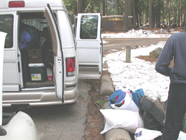
_______________________________
You might also want to read How to not collide with a deer, Safe driving in rain and fog, Snow chain rentals.
Prepare for winter driving has a link to bad weather driving tips, tips for using tire chains, tricks for dealing with frozen car locks, how to prepare your vehicle for winter driving, a winter survival kit for your car and what to do if you get stranded.
It includes this advice:
My windows are fogging up faster than my navigator can wipe it off!
Yes, it’s cold out and you filled your car with people to share the trip expenses. They all are exhaling foggy breath, especially when you all sing along to that CD. Have them take turns holding their breath. Okay, maybe that’s not practical. Have them pay up for the gas expense in advance and let them off at the next bus stop. Unthinkable? The swimmers in the Outdoor Club know they can lick the inside of their swim goggles to prevent fogging, but a windshield…?
Not really practical either, well then…
The fog on the windows could be caused by trying to keep the car interior warm. When air is warm breath condenses, so stop and have your passengers put on those longjohns, jackets and maybe even hats, then keep the car cool. Even a few degrees will affect the maximum amount of water in the air quite significantly. With less water in the air the windows will frost up less.
Make sure your air conditioner or heater is in the fresh air position rather than recirc. The recirculate setting reuses the humid air already in the car. The air in the car is quite humid due to those mammals you are giving a ride to, and the outside air is less humid (even if it’s raining/snowing), so pull it in and push it against the inside of the window. And even though you are trying to keep the air in the main compartment coolish, the windows themselves need to be warmer than the cold air/rain/snow hitting them, so set the temperature to warm. Pulling in outside air has the drawback of sucking in truck or diesel exhaust, so pull back from that big rig or go around it. Set the fan to its highest setting if you are going in slow traffic.
Now you can go back to your sing-along or heavy gossip session.
Traveling in the snow? Next time you all get into the car, have each person take a seat, then kick their feet together outside of the car to knock excess snow off before they swing their legs in. Less snow melting in the vehicle also means less moisture in the car and less fog on the windows.
It uses less gas to drive with the air conditioning on than to drive with windows open.
Some people recommend wiping your windshield interior with shaving cream to de-fog it, but we do not because it can smell minty to the bears and they break into vehicles they can smell “food” inside of.
_______________________
This site tries to keep up on gas prices across the country:
As we understand it, you do not have to download any app to get to the prices.
_______________________
“Welcome to Radio-Locator, the most comprehensive radio station search engine on the internet. We have links to over 10,000 radio station web pages and over 2500 audio streams from radio stations in the U.S. and around the world.”
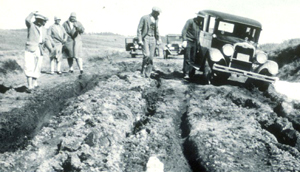
For details about De Anza Outdoor Club events and on how to find us to pay for a membership, sign up for events or volunteer, go to:
Outdoor Club Coming Attractions
Grand Tetons trip transportation has flight info, driving distances and guesses at gas cost, previous trip examples, etc.
Snow camp carpools and driving directions has directions to Yosemite, as does San Jose area to Yosemite via 120.
for ideas on how to get a ride for a trip go to:
see also: wildlife jams
from the National Park Service historic photo collection:
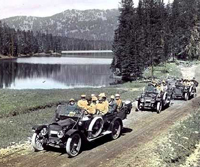
In 1921, Raymond H. Bailey wrote a Handbook of Yosemite National Park. The chapter Motoring in Yosemite National Park can be read at:
Motoring in Yosemite National Park
“The driver of the car has one thing to keep in mind and that is, that he must keep his eyes on the road and let the rest of the passengers look at the scenery. His car should be equipped with a good loud horn and it should be used frequently.
The principal requisite for good mountain driving is good common sense, and if this is coupled with the following suggestions, no one need have any hesitancy about attempting the trip…
Radiators. Never try to make a record for small consumption of water on a trip over any of the roads into Yosemite. Such a practice unnecessarily heats up the engine, and thus increases the consumption of gas and oil. Keep the radiator full of water at all times. The water of mountain creeks is usable, but it should be strained through a cloth before using…
Supplies to Carry. Carry an extra supply of oil: it is more essential than gasoline.
Carry a supply of extra bolts and nuts for specific make of car.
Carry a spare fan belt.
Carry a can of grease and use it freely.
Seeing the Country. Take down the top when you get into the mountains if you want to see some of the most beautiful scenery along the route.
Road Rules to Remember. Always stay on the right side of the road.
Up-hill traffic has the right-of-way,—according to State and National Park law.”
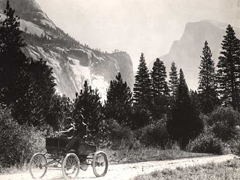
——————————————————————-
The author of this webpage, (written as a reading assignment for my students), does not give any warranty, expressed or implied, nor assume any legal liability or responsibility for the accuracy, completeness, or usefulness of any information, product, or process included in this website or at websites linked to or from it. Users of information from this website assume all liability arising from such use.


